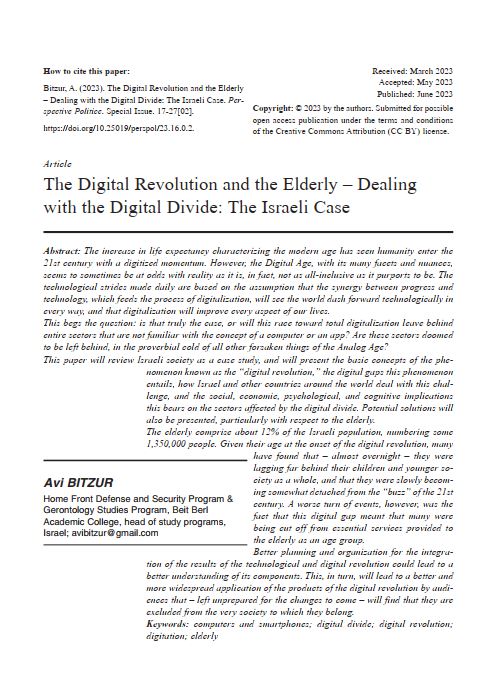The Digital Revolution and the Elderly – Dealing with the Digital Divide: The Israeli Case
Abstract
The increase in life expectancy characterizing the modern age has seen humanity enter the 21st century with a digitized momentum. However, the Digital Age, with its many facets and nuances, seems to sometimes be at odds with reality as it is, in fact, not as all-inclusive as it purports to be. The technological strides made daily are based on the assumption that the synergy between progress and technology, which feeds the process of digitalization, will see the world dash forward technologically in every way, and that digitalization will improve every aspect of our lives.
This begs the question: is that truly the case, or will this race toward total digitalization leave behind entire sectors that are not familiar with the concept of a computer or an app? Are these sectors doomed to be left behind, in the proverbial cold of all other forsaken things of the Analog Age?
This paper will review Israeli society as a case study, and will present the basic concepts of the phenomenon known as the “digital revolution,” the digital gaps this phenomenon entails, how Israel and other countries around the world deal with this challenge, and the social, economic, psychological, and cognitive implications this bears on the sectors affected by the digital divide. Potential solutions will also be presented, particularly with respect to the elderly.
The elderly comprise about 12% of the Israeli population, numbering some 1,350,000 people. Given their age at the onset of the digital revolution, many have found that – almost overnight – they were lagging far behind their children and younger society as a whole, and that they were slowly becoming somewhat detached from the “buzz” of the 21st century. A worse turn of events, however, was the fact that this digital gap meant that many were being cut off from essential services provided to the elderly as an age group.
Better planning and organization for the integration of the results of the technological and digital revolution could lead to a better understanding of its components. This, in turn, will lead to a better and more widespread application of the products of the digital revolution by audiences that – left unprepared for the changes to come – will find that they are excluded from the very society to which they belong.

Downloads
Published
Issue
Section
License
Copyright (c) 2023 Avi BITZUR

This work is licensed under a Creative Commons Attribution-NonCommercial-ShareAlike 4.0 International License.



